IPE/BC is an independent, non-partisan organization, however we recognize that IPE/BC Associates and guest authors hold a range of views and interests relative to public schools, education issues, and the political landscape in BC. Perspectives is an opportunity for Associates and others to share their ideas in short, accessible essays.
Beyond the gap: The need for accountable education funding that demonstrates that society values inclusion
April 10, 2025
By Andrée Gacoin
In British Columbia, school districts have an obligation to provide a meaningful education to all students who arrive at their doors, including those with disabilities and diverse educational needs. As stated by the Supreme Court of Canada, inclusive education service is not a “dispensable luxury” but instead is “the ramp that provides access to the statutory commitment to education made to all children in British Columbia.”[i]
 The Ministry of Education and Child Care’s policy manual for the provision of inclusive education services outlines a “continuous and flexible” process for identifying students with disabilities and diverse needs and then providing the necessary supports.[ii] Broadly, a student with observed exceptionalities in learning and/or behaviour should be referred to a school-based team. This is a team of teachers and other professionals (e.g., counsellors, psychologists, speech and language pathologists) who come together to discuss and problem-solve how to support specific students and the classroom teacher.[iii] Teams may request further assessments (e.g., psycho-educational testing) which are used to assign students to Ministry-defined inclusive education categories. These categories are then used to determine supplemental funding needed by the district.
The Ministry of Education and Child Care’s policy manual for the provision of inclusive education services outlines a “continuous and flexible” process for identifying students with disabilities and diverse needs and then providing the necessary supports.[ii] Broadly, a student with observed exceptionalities in learning and/or behaviour should be referred to a school-based team. This is a team of teachers and other professionals (e.g., counsellors, psychologists, speech and language pathologists) who come together to discuss and problem-solve how to support specific students and the classroom teacher.[iii] Teams may request further assessments (e.g., psycho-educational testing) which are used to assign students to Ministry-defined inclusive education categories. These categories are then used to determine supplemental funding needed by the district.
Unfortunately, the reality is that the funding provided to school districts to provide inclusive education services is woefully inadequate. In addition to core operational funding (which is primarily based on the number of students enrolled in a district in a particular year), the Ministry of Education and Child Care allocates supplementary funding for inclusive education based on a per-pupil funding amount for only some inclusive education categories. For example, schools receive supplemental funding for the number of students with a diagnosis of Autism Spectrum Disorder (ASD) or who have Moderate/Profound Intellectual Disabilities.[iv] However, school districts do not receive additional funding for other identified needs, such as learning disabilities, students requiring moderate behavior supports, or enrichment opportunities for students who are gifted. Furthermore, the funding that is provided is “block funding,” meaning that a lump sum is provided to the district and is not specifically allocated for particular students or supports.
Every year, BC school districts spend more on inclusive education than they receive in funding from the Ministry of Education and Child Care. BCTF Research analysed funding and spending data on inclusive education from 2007-2024 and found a persistent funding gap over at least the past 17 years. In 2023-24, for example, provincial government funding only covered 72.3% of what BC school districts spent to provide inclusive education services. In dollar terms, this was a $340 million dollar funding shortfall that districts were forced to cover with their core operational funding. Besides creating pressure for districts to redirect funding from other operational areas, the lack of funding forces districts to ration inclusive education staff and services. Research with teachers has found that this can be seen as having to “triage the system,” including trying to fit in supports through creative scheduling, shifting support intended for one student to multiple students, and cobbling multiple small supports together.[v]
least the past 17 years. In 2023-24, for example, provincial government funding only covered 72.3% of what BC school districts spent to provide inclusive education services. In dollar terms, this was a $340 million dollar funding shortfall that districts were forced to cover with their core operational funding. Besides creating pressure for districts to redirect funding from other operational areas, the lack of funding forces districts to ration inclusive education staff and services. Research with teachers has found that this can be seen as having to “triage the system,” including trying to fit in supports through creative scheduling, shifting support intended for one student to multiple students, and cobbling multiple small supports together.[v]
Crucially, data also indicates that even if provincial inclusive education funding was increased to meet spending, it would not be enough. The 2024-25 BCTF Membership Survey[vi] found that only 13% of teachers feel that students with disabilities or diverse needs are having their needs met. As one teacher shared, “our greatest challenge in our district is not having the funding or EA support to properly manage and/or support real inclusion.[vii]
Read through this lens, the chronic underfunding of BC’s inclusive education system is deeply disturbing. Children with disabilities and diverse needs have the right to meaningful education. They have a right to feel a sense of belonging in their school community and be supported by policies and procedures that value the success of all students.
 Increased funding alone will not “fix” inclusive education. However, it is the necessary condition for moving BC along the path of more inclusive school communities.[viii] Imagine communities in which every child has access to timely learning assessments and specialist support services. Imagine sites where teachers and other education workers have the time and space for collaboration and relationship building within the school and the broader community. We can get there by enacting inclusive policies, approaches and procedures that are grounded in a rights-based perspectives – enabling classrooms and schools where all students are thriving and supported to explore and develop their gifts, passions and abilities.
Increased funding alone will not “fix” inclusive education. However, it is the necessary condition for moving BC along the path of more inclusive school communities.[viii] Imagine communities in which every child has access to timely learning assessments and specialist support services. Imagine sites where teachers and other education workers have the time and space for collaboration and relationship building within the school and the broader community. We can get there by enacting inclusive policies, approaches and procedures that are grounded in a rights-based perspectives – enabling classrooms and schools where all students are thriving and supported to explore and develop their gifts, passions and abilities.
________________________________________________________________________________________________
[i] Moore v. British Columbia (Education). See https://decisions.scc-csc.ca/scc-csc/scc-csc/en/item/12680/index.do
[ii] See https://www2.gov.bc.ca/assets/gov/education/administration/kindergarten-to-grade-12/inclusive/inclusive_ed_policy_manual.pdf
[iii] See Shields, K. (2018). Use the power of your school-based team to help yourself and your students. Teacher Magazine, 31.
[iv] Funding is provided according to three levels, with particularly inclusive education needs within each level. See p. 38 of the Ministry’s inclusive education policy manual for more details – https://www2.gov.bc.ca/assets/gov/education/administration/kindergarten-to-grade-12/inclusive/inclusive_ed_policy_manual.pdf
[v] See https://www.bctf.ca/docs/default-source/for-news-and-stories/thelandscapeofinclusion97ee6f5ddf14430994d7d266b141e404.pdf?sfvrsn=9afa2c50_0
[vi] Report forthcoming. The random sample survey, fielded in February 2025, provides results that can be generalized to the overall teacher population in BC’s public schools with reasonable accuracy and a small margin of error: +/- 1.5% 19 times out of 20.
[vii] See https://www.bctf.ca/docs/default-source/for-news-and-stories/bctf-membership-survey-summary-report-2023-2024.pdf?sfvrsn=3bdb986c_2
[viii] These ideas were developed at the June 2024 Think Tank on Meaningful Inclusion for Students with Disabilities and Diverse Needs. See: [viii] https://www.bctf.ca/docs/default-source/default-document-library/inclusion-think-tank-report.pdf?sfvrsn=6bbd94c9_2
Dr. Andrée Gacoin is the Director of the Information, Research and International Solidarity Division at the BC Teachers’ Federation and an IPE/BC Fellow. Her research focuses on developing a unique, in-depth and contextualized exploration of education in BC from the perspective of teachers. Andrée is particularly interested in using research as advocacy to uphold and strengthen an inclusive public education system.
 This isn’t to say that excessive cell phone use or social media isn’t negatively impacting youth; rather, it suggests that banning phones in schools isn’t the solution politicians often claim it to be.
This isn’t to say that excessive cell phone use or social media isn’t negatively impacting youth; rather, it suggests that banning phones in schools isn’t the solution politicians often claim it to be. shortchanging them by opting for simplistic (and often hard-to-enforce) bans instead of more comprehensive, nuanced approaches? Wouldn’t it be better to help them develop healthy tech habits and the ability to set boundaries for themselves, enabling them to use technology constructively?
shortchanging them by opting for simplistic (and often hard-to-enforce) bans instead of more comprehensive, nuanced approaches? Wouldn’t it be better to help them develop healthy tech habits and the ability to set boundaries for themselves, enabling them to use technology constructively?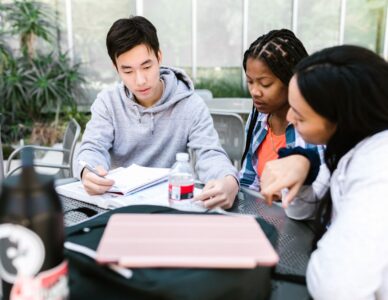 phone use. Schools and the education system are well-positioned to play a central role in this, but it will take much more than the “headline-grabbing gimmicks” of cellphone bans.
phone use. Schools and the education system are well-positioned to play a central role in this, but it will take much more than the “headline-grabbing gimmicks” of cellphone bans. their children with disabilities and/or diverse needs. These parents and many others know it’s a system under stress; they and their children regularly and directly experience the impact of teacher and support staff shortages and chronic underfunding. They also know how difficult it is to access the education decision-makers and be heard. And they speak to the fact that placing students with disabilities and/or diverse needs in classrooms without the necessary supports or, as is sometimes the case, in segregated classrooms, serves to stigmatize their children and seriously undermines their ability to succeed.
their children with disabilities and/or diverse needs. These parents and many others know it’s a system under stress; they and their children regularly and directly experience the impact of teacher and support staff shortages and chronic underfunding. They also know how difficult it is to access the education decision-makers and be heard. And they speak to the fact that placing students with disabilities and/or diverse needs in classrooms without the necessary supports or, as is sometimes the case, in segregated classrooms, serves to stigmatize their children and seriously undermines their ability to succeed.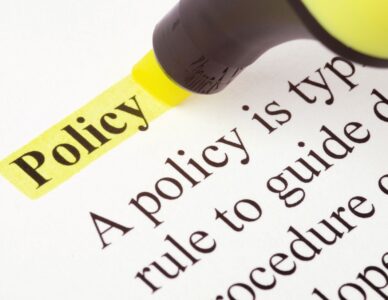 Looking back, inclusion first became a government initiative in the 1980s. The Royal Commission on Education report in 1988 and subsequent education School Act revisions mandated the closing of segregated schools and established the requirement that neighbourhood schools were to provide for the success of all children. There was the expectation of significant positive change and, for a time, there were meaningful steps in that direction. But, years of underfunding and the lack of adequate staffing and supports has us seeing inadequate supports as the “norm” and exclusionary practices coming back- reduced time at school, exclusion from certain activities, and, in some cases, even segregated programs and classes.
Looking back, inclusion first became a government initiative in the 1980s. The Royal Commission on Education report in 1988 and subsequent education School Act revisions mandated the closing of segregated schools and established the requirement that neighbourhood schools were to provide for the success of all children. There was the expectation of significant positive change and, for a time, there were meaningful steps in that direction. But, years of underfunding and the lack of adequate staffing and supports has us seeing inadequate supports as the “norm” and exclusionary practices coming back- reduced time at school, exclusion from certain activities, and, in some cases, even segregated programs and classes.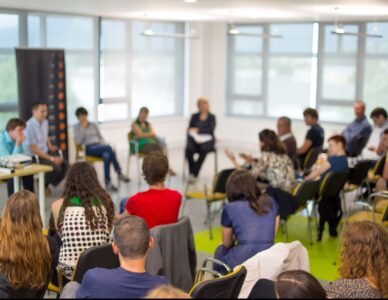 We’d add one more step. We’d encourage everyone to call on each school district and the Ministry of Education and Child Care to hold similar forums with parents/caregivers, support staff, educators and students to learn from their experiences and recommit to fully supported inclusion in all of our public schools.
We’d add one more step. We’d encourage everyone to call on each school district and the Ministry of Education and Child Care to hold similar forums with parents/caregivers, support staff, educators and students to learn from their experiences and recommit to fully supported inclusion in all of our public schools.
 In schools, staff work diligently to ensure that programs are effective. Measurable goals are created, data is gathered, and results are reviewed regularly. Reports regarding student progress are generated at prescribed intervals. These reports are shared with parents and relevant school staff, covering everything from classroom achievements to individualized programs such as speech-language therapy. The information is securely, confidentially stored for future reference as needed. The rationale behind this process is clear: if we do not measure our efforts, we cannot determine whether our interventions are truly making a difference.
In schools, staff work diligently to ensure that programs are effective. Measurable goals are created, data is gathered, and results are reviewed regularly. Reports regarding student progress are generated at prescribed intervals. These reports are shared with parents and relevant school staff, covering everything from classroom achievements to individualized programs such as speech-language therapy. The information is securely, confidentially stored for future reference as needed. The rationale behind this process is clear: if we do not measure our efforts, we cannot determine whether our interventions are truly making a difference. Schools operate with a great deal of transparency. Classroom teachers provide daily plans that are utilized by themselves or a teacher-on-call. Support staff, such as English Language Learning teachers and contracted specialists like occupational therapists, follow universal referral systems, administer standardized assessments, document observations and provide reports . Caseload information is readily available to school administrators, and priorities are confidentially discussed during school-based team meetings.
Schools operate with a great deal of transparency. Classroom teachers provide daily plans that are utilized by themselves or a teacher-on-call. Support staff, such as English Language Learning teachers and contracted specialists like occupational therapists, follow universal referral systems, administer standardized assessments, document observations and provide reports . Caseload information is readily available to school administrators, and priorities are confidentially discussed during school-based team meetings. As schools work hard to maintain a safe and supportive environment for students, the question remains: Does the presence of School Police Liaison Officers truly contribute to the safety of our schools, or is it simply an unproven assumption? Without clear data and transparent reporting on the program’s effectiveness, it’s difficult to justify its widespread adoption. Perhaps it’s time for a deeper, more data-driven conversation about how best to ensure the safety and well-being of students without relying on programs that lack measurable evidence of success. It’s crucial that we continue to explore alternative solutions that prioritize student welfare while addressing the complexities of modern school safety.
As schools work hard to maintain a safe and supportive environment for students, the question remains: Does the presence of School Police Liaison Officers truly contribute to the safety of our schools, or is it simply an unproven assumption? Without clear data and transparent reporting on the program’s effectiveness, it’s difficult to justify its widespread adoption. Perhaps it’s time for a deeper, more data-driven conversation about how best to ensure the safety and well-being of students without relying on programs that lack measurable evidence of success. It’s crucial that we continue to explore alternative solutions that prioritize student welfare while addressing the complexities of modern school safety.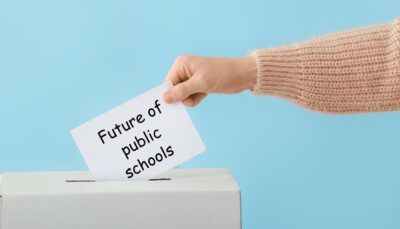 election issue, this particular race was dominated by harmful and hateful rhetoric that sought to control and further privatize education. This included:
election issue, this particular race was dominated by harmful and hateful rhetoric that sought to control and further privatize education. This included: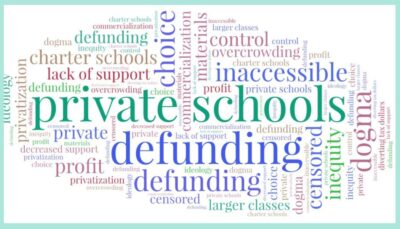 support for the Conservatives in many parts of the province. Their ideas for education are reflected in the ongoing advocacy of right-wing Think Tanks, such as the Fraser Institute, that champion education reforms “to achieve better value for money and improved results for both students and taxpayers.”
support for the Conservatives in many parts of the province. Their ideas for education are reflected in the ongoing advocacy of right-wing Think Tanks, such as the Fraser Institute, that champion education reforms “to achieve better value for money and improved results for both students and taxpayers.” As illustrated in the case of the BC election, these conservative political parties are linked to the rise of the “parental rights” movement in Canada – a movement that embodies the many links between far-right ideologies and interest in education privatization. In BC, for example, the attacks have been focused on a program called SOGI 123, which supports teachers to make schools safer and more inclusive for students of all sexual orientations and gender identities. Contrary to the arguments of the new Rights, research illustrates the positive impact of this program. A recent evaluation of SOGI 123, done by researchers at the University of British Columbia, found that the program decreased bullying and sexual orientation discrimination for both LGBT+ and also for heterosexual students.
As illustrated in the case of the BC election, these conservative political parties are linked to the rise of the “parental rights” movement in Canada – a movement that embodies the many links between far-right ideologies and interest in education privatization. In BC, for example, the attacks have been focused on a program called SOGI 123, which supports teachers to make schools safer and more inclusive for students of all sexual orientations and gender identities. Contrary to the arguments of the new Rights, research illustrates the positive impact of this program. A recent evaluation of SOGI 123, done by researchers at the University of British Columbia, found that the program decreased bullying and sexual orientation discrimination for both LGBT+ and also for heterosexual students.